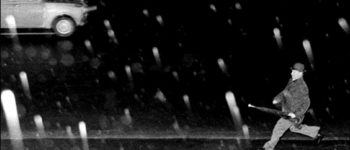1974: Busting Sutch
September 27, 2019
By AHNZ
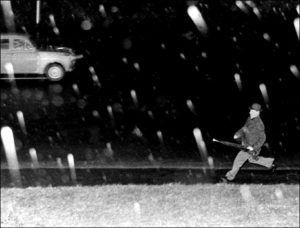
Today in New Zealand history, 27 September 1974, the Security Intelligence Service (SIS) swooped on retired public servant Bill Sutch and took him in to custody. Sutch was charged with spying on New Zealand for the Soviets.
Moments before, Sutch had been meeting with diplomat and KGB agent Dimitri Razgovorov seen here (above) fleeing the scene in the rain with his closed umbrella. Sutch (68yo) was vindicated at trial but died soon after; Court battles take their toll even on young men. What historians have wondered ever since is was old Bill really selling us out to the Commies?
Some of His Parts
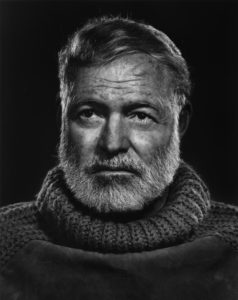 Sutch (b.1907) came of age in the wake of New Zealand’s Great Wrong War (aka WW1) as part of what Strauss-Howe Generational Theory and others call The Lost Generation. John Mulgan and Ernest Hemingway were part of this cohort as was the author of All Quiet on the Western Front: “The war has ruined us for everything….We are not youth any longer. We don’t want to take the world by storm. We are fleeing..” Yet, Sutch’s birth year and cultural lag made him one of the last of the Lost and the first of the world-changing ‘Heroic’ ‘Greatest Generation’.
Sutch (b.1907) came of age in the wake of New Zealand’s Great Wrong War (aka WW1) as part of what Strauss-Howe Generational Theory and others call The Lost Generation. John Mulgan and Ernest Hemingway were part of this cohort as was the author of All Quiet on the Western Front: “The war has ruined us for everything….We are not youth any longer. We don’t want to take the world by storm. We are fleeing..” Yet, Sutch’s birth year and cultural lag made him one of the last of the Lost and the first of the world-changing ‘Heroic’ ‘Greatest Generation’.
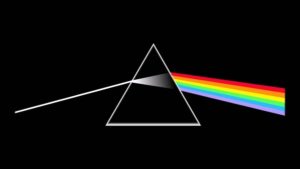 Young Bill was, thus, a powerful hybrid mix. Partly a New Zealander who fled a haunted world for castles of escapist imagination that made for literary giants, partly a man of action who would get hands-on to shape the real world now. Like Te Ua Haumene and Norman Kirk, the mature madness of Sutch had been initiated in the Wesleyan Methodist Church. Crucially, rather than dream up his own Fourth World or literary superstructures in verse (like the Phoenix Generation) the young intellectual had economics. The brilliant light of Sutch and all the above influences were beamed through the prism of Keynesian Economics.
Young Bill was, thus, a powerful hybrid mix. Partly a New Zealander who fled a haunted world for castles of escapist imagination that made for literary giants, partly a man of action who would get hands-on to shape the real world now. Like Te Ua Haumene and Norman Kirk, the mature madness of Sutch had been initiated in the Wesleyan Methodist Church. Crucially, rather than dream up his own Fourth World or literary superstructures in verse (like the Phoenix Generation) the young intellectual had economics. The brilliant light of Sutch and all the above influences were beamed through the prism of Keynesian Economics.
Into the Wild
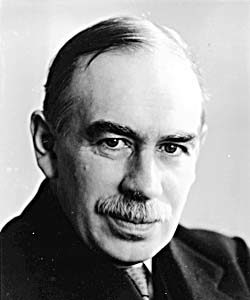 In 1931 and 1932 the economics departments of the world were dizzy for the doctrine of John Maynard Keynes. These were the years Sutch’s economics training culminated with an M.A. at home and a PhD from New York. The “…Keynesian Revolution went to Washington by way of Harvard, where Keynes’s ideas had blowin in like a gale force wind.” writes Ray Canterbury.
In 1931 and 1932 the economics departments of the world were dizzy for the doctrine of John Maynard Keynes. These were the years Sutch’s economics training culminated with an M.A. at home and a PhD from New York. The “…Keynesian Revolution went to Washington by way of Harvard, where Keynes’s ideas had blowin in like a gale force wind.” writes Ray Canterbury.
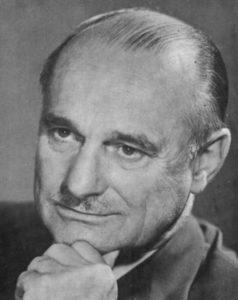
Sutch’s Left-Wing fanaticism thus gained jargon, arcane esoteric theory, and academic respectability. For that matter, Sutch styled his own personal appearance down to the hair and moustache along identical lines as the great rock star of economics himself. Bill would be the missionary priest of this new voodoo who would bring Keynes’ dangerous ideas back to Wellington. It is possible and perhaps necessary to be more specific about just which stripe of the many modern Keynsians Sutch was rather than just lump him in as Yet-Another-Fabian-Socialist-Keynsian-Spin-Off. However, I’ve yet to meet anyone, even among students majoring in economics, who wanted to go even this deep into distinctions.
 At this point, like so many Kiwis, Sutch embarked on his OE¹ by going into the wild. The archetypical heroes journey involves leaving home in quest of great wisdom, facing challenge and trials, overcoming them by unlocking one’s hidden strengths, then returning home with the fire one has discovered to share with one’s own people. Sutch, upon graduation, now sought to test himself by setting his own rite of passage…
At this point, like so many Kiwis, Sutch embarked on his OE¹ by going into the wild. The archetypical heroes journey involves leaving home in quest of great wisdom, facing challenge and trials, overcoming them by unlocking one’s hidden strengths, then returning home with the fire one has discovered to share with one’s own people. Sutch, upon graduation, now sought to test himself by setting his own rite of passage…
“He told of walking around the Arctic Circle into Northern Russia with nothing but a small backpack, a change of underwear, a toothbrush and chocolate (for barter); sleeping out on the tundra in Lapland, in the market square in Tashkent and the camps of Afghan tribesmen.”- SRB: W B Sutch – Prophet Without Honour; Bollinger; Scoop
Bill’s quest didn’t end with him in a Detroit prison cell like some people I know. Nor did he end up a frozen corpse in Alaska as did Chris McCandless (Ref. Into The Wild (2007.)) Even the wild winter New Zealand bush, the disapproval of a nation, and the inconvenience of the (then) greatest search and rescue operation in our history did not push back against the man’s illusions of himself.
“…Dr. Sutch gained public notoriety when his mixed-sex tramping party got stuck in the Tararuas, trapped by swollen streams….A massive search and rescue operation was undertaken – one of the first ever. Sutch’s party walked out of the hills safely a fortnight later, to tell the press that they “were never lost”.- ibid
Sutch, it seemed, passed all his self-imposed rites of passage without man or nature pushing back. He didn’t learn humility or flexibility but instead vindication that his methods and his will were equal to anything life could throw at him. Bill now exited the wild crucible to spend the next forty years as a (the?) top New Zealand public intellectual and policy-maker.
No Left Turn
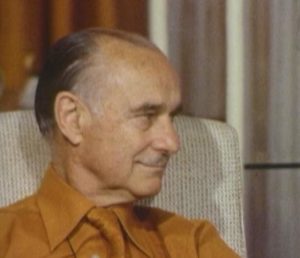
During the same time Fabian Communist George Bernard Shaw was being well-received in New Zealand, Sutch had started his new job in central government. He was the main man and key brain to Gordon Coates in the Forbes-Coates coalition Government. Farmer Coates shared all of Sutch’s sentiments but none of the financial talent so delegated the heavy-lifting to his young aide. When Sutch later praised Coats as “New Zealand’s greatest finance minister” he was really applauding himself! George Forbes may have been Prime Minister, but practically speaking Coates was, from 1935, the Government and behind him there was Sutch.
 Together, these Leftys socialised New Zealand as quickly and joyously as they could before the 1935 election put a stop to it. The socialistic state interventionism was decisive and swift and unmandated, much as Roger Douglas would also be years later but because he was Right and they Left there is no memory let alone blame attached. Coates and Sutch have a lasting legacy in the awful Reserve Bank of New Zealand: One Bank to rule them all, One Bank to find them, One Bank to bring them all, and in the darkness control the money supply and print phoney dollars for The State to spend on bullshit schemes!
Together, these Leftys socialised New Zealand as quickly and joyously as they could before the 1935 election put a stop to it. The socialistic state interventionism was decisive and swift and unmandated, much as Roger Douglas would also be years later but because he was Right and they Left there is no memory let alone blame attached. Coates and Sutch have a lasting legacy in the awful Reserve Bank of New Zealand: One Bank to rule them all, One Bank to find them, One Bank to bring them all, and in the darkness control the money supply and print phoney dollars for The State to spend on bullshit schemes!
With Labour 1.0 taking power, Sutch was always around but the hard-core Left factions he aligned with never came to fruition. In 1939, Sutch teamed up with John A. Lee to publish the Psychopathology in Politics attack on Savage but rather than gain control of Labour 1.0 Lee was himself given the boot. Sutch was a writer for hard-core Lefty magazine Tomorrow; Labour 1.0 banned it in 1940. Sutch, in 1943, was economics and foreign affairs advisor to Uncle Scrim’s failed campaign for office. Alongside Walter Nash, Sutch was back in the saddle for Labour 2.0 but that government fell after just one term. Wherever New Zealand’s Hard Left tried something on, Sutch was on the spot trying to get a Left Turn in our direction that has never quite been consummated. After this time Sutch became a commentator and ubiquitous writer of New Zealand history right up to the moment the cops busted him.
The Think Tank Affair

Frustrated with his frenemies within Labour 3.0, Prime Minister Kirk turned to the old stalwart Comrade Kiwi Bill for economic policy help. Ruling parties put on a united front but really there is more hatred, rivalry, and knives-in-the-backs for politicians within the same party than for the so-called opposition. Kirk hard ultra-lefty election promises he wanted to keep to the people of New Zealand and his ministers were not cooperating.
In May 1974 Kirk turned to his Party VP and backbencher Gerald O’Brien to put together a working group to break this deadlock. O’Brien’s crack Think Tank naturally included Sutch and naturally proposed socialisation of the banks, insurance companies, and yet more power for the Reserve Bank. The enemies of this little faction included the SIS who reported to Kirk suspicions that Sutch was an enemy agent. Kirk didn’t take his badged bureaucrats any more seriously than he did the advice of Treasury economists though and went ahead with the Think Tank.
“Let us put all of these incidents into chronological order: In April 1974 Kirk is informed that Sutch is under suspicion of espionage. In May, he asks O’Brien to covertly solicit the help of Sutch and others in speeding up the implementation of Labour’s policies.”- No Left Turn (2007); Trotter
 When Kirk died on 31 August 1974, O’Brien and Sutch and the Think Tank lost its political cover. Hunting season was “on” as the new Labour 3.0 leadership cleaned house starting with not-one-of-ours public-enemy-number-one, Comrade Bill. Now came the farcical SIS bust on the old man talking in the rain. Now came the 1 day trial with no leg to stand on but nevertheless did the job of hastening Bill’s death and taking him out of circulation.
When Kirk died on 31 August 1974, O’Brien and Sutch and the Think Tank lost its political cover. Hunting season was “on” as the new Labour 3.0 leadership cleaned house starting with not-one-of-ours public-enemy-number-one, Comrade Bill. Now came the farcical SIS bust on the old man talking in the rain. Now came the 1 day trial with no leg to stand on but nevertheless did the job of hastening Bill’s death and taking him out of circulation.
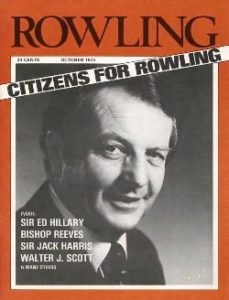 New Prime Minister William Rowling’s and Dr Martyn Finlay’s version of Labour 3.0 was in! Rowling Victimhood Culture didn’t last too long before Muldoonist Slave Culture sent them on their way after the 1975 election. While it lasted, the rump of Labour 3.0 went on a spending spree themselves while taxing the population in cruel new ways and adding to inflationary woes. What started by snuffing Sutch finished by poisoning the well water Muldoon’s New Zealand would have to drink from.
New Prime Minister William Rowling’s and Dr Martyn Finlay’s version of Labour 3.0 was in! Rowling Victimhood Culture didn’t last too long before Muldoonist Slave Culture sent them on their way after the 1975 election. While it lasted, the rump of Labour 3.0 went on a spending spree themselves while taxing the population in cruel new ways and adding to inflationary woes. What started by snuffing Sutch finished by poisoning the well water Muldoon’s New Zealand would have to drink from.
In my opinion the courts got it right about Sutch: Not guilty. He was a vain man to think he could control the economy like some engine, and rotten for where he wanted us to go as a country. So are so many others, especially those indoctrinated by academic economic thought. He was honest about being a socialist all his life long, nobody could fail to miss it! Gaining political influence to ram his own economic theories down everyone else’s throat is, to all Statists, just part of the ‘game’ everyone is playing at all times in trying to do each other over. Sutch was just one more.
“Politics is a game, democracy is the genre of game. In order to win the game, you have two options: Learn the rules of the game and play them better than anybody else, or learn the rules and bend them enough so the game is sufficiently changed and you win in that process. If you abstain from the game, guess what, you aren’t;t playing nor do you get to play.”- Ri Theodore, quoted in The Only Winning Move Is Not To Play; NZB3
Only Anarchists have a higher standard than that so let someone who doesn’t want to use Government to play God with the Kiwi economy cast the first stone at this man who did it best and longest.
—
1 Overseas Experience
Ref. A Brief History Of Economics; Canterbury (2001)
Image ref. Sutch; Survey – Where Have All the Wowsers Gone? (1972); NZ On Screen
 Like Comment Share
Like Comment Share

